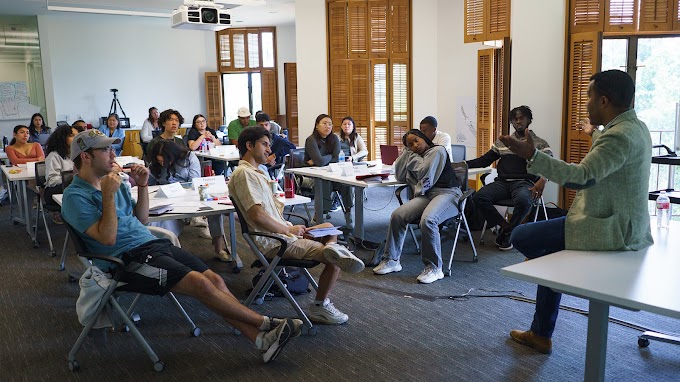Title: A Step-by-Step Guide to Securing Admission for Bachelor's Studies in the US
Introduction:
Securing admission to a bachelor's program in the United States is a significant milestone for students seeking a high-quality education and diverse cultural experiences. However, the application process can be competitive and complex, requiring careful planning and thorough preparation. This step-by-step guide is designed to help prospective students navigate the admissions process successfully, from researching universities to submitting a compelling application.
1. Researching Universities:
- Begin by researching universities in the US that offer bachelor's programs in your field of interest. Consider factors such as academic reputation, program offerings, location, campus culture, and financial aid opportunities.
- Utilize online resources, university websites, rankings, and testimonials from current or former students to gather information about each institution.
- Create a list of universities that align with your academic and personal preferences, considering factors like campus size, diversity, extracurricular activities, and career services.
2. Understanding Admission Requirements:
- Familiarize yourself with the general admission requirements for international students applying to bachelor's programs in the US. These typically include academic transcripts, standardized test scores (SAT or ACT), English language proficiency tests (TOEFL or IELTS), letters of recommendation, and a personal statement or essay.
- Some universities may have additional requirements or specific prerequisites for certain programs, so carefully review the admission criteria for each institution on your list.
- Pay attention to application deadlines, as missing them could impact your chances of admission.
3. Meeting Academic Standards:
- Ensure that your academic qualifications meet the minimum requirements set by the universities you're applying to. This may include achieving a certain GPA (Grade Point Average) and completing specific high school courses.
- If your academic credentials are from a non-US institution, you may need to have them evaluated by a credential evaluation service to determine their equivalency in the US education system.
4. Taking Standardized Tests:
- Register for and take the required standardized tests, such as the SAT or ACT for undergraduate admissions and the TOEFL or IELTS for English language proficiency.
- Prepare thoroughly for these exams by utilizing study guides, practice tests, and tutoring resources to achieve competitive scores.
5. Demonstrating English Proficiency:
- International students whose native language is not English are typically required to demonstrate proficiency in English through standardized tests like the TOEFL or IELTS.
- Prepare for these tests by practicing reading, writing, listening, and speaking in English. Consider enrolling in language courses or hiring a tutor if needed.
- Some universities may offer conditional admission or English language programs for students who need additional language support before beginning their degree programs.
6. Crafting a Compelling Application:
- Take your time to complete each component of the application thoroughly and thoughtfully. This includes writing a compelling personal statement or essay that highlights your academic achievements, extracurricular activities, career goals, and reasons for choosing the specific university and program.
- Request letters of recommendation from teachers, counselors, or other individuals who can speak to your academic abilities, character, and potential for success in higher education.
- Double-check all application materials for accuracy and completeness before submitting them.
7. Exploring Financial Aid and Scholarships:
- Investigate the availability of financial aid, scholarships, and grants for international students at each university on your list.
- Complete any required financial aid forms or scholarship applications by the specified deadlines.
- Consider other sources of funding, such as private scholarships, government-sponsored programs, or loans, to help cover the cost of tuition, fees, housing, and living expenses.
8. Submitting Your Application:
- Submit your completed application materials, including transcripts, test scores, letters of recommendation, and any required essays or statements, before the deadline.
- Keep track of your application status and follow up with the admissions office if necessary to ensure that all materials have been received and processed.
9. Preparing for Interviews:
- Some universities may require an admissions interview as part of the application process. Prepare for these interviews by researching the university, practicing common interview questions, and articulating your academic and career goals effectively.
- Dress professionally, arrive on time, and approach the interview with confidence and enthusiasm.
10. Waiting for Admission Decisions:
- After submitting your application, be patient while waiting for admission decisions to be announced. This can be a nerve-wracking time, but try to stay positive and focus on other aspects of your life.
- In the meantime, continue to explore backup options and consider alternative pathways if necessary.
Conclusion:
Securing admission to a bachelor's program in the US requires careful planning, diligent preparation, and perseverance. By researching universities, meeting admission requirements, demonstrating academic excellence and English proficiency, crafting a compelling application, exploring financial aid options, and preparing for interviews, prospective students can increase their chances of securing admission to their desired institution. It's essential to stay organized, proactive, and resilient throughout the application process and seek guidance from academic advisors or admissions counselors when needed. With dedication and determination, pursuing a bachelor's degree in the US can be a rewarding and transformative experience.






